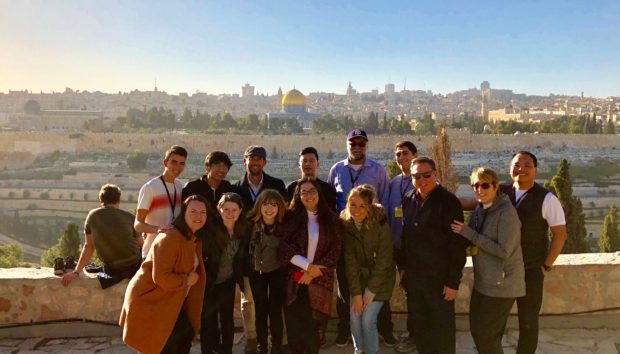
Just 24-hours after ringing in the new year, a group of eight Loyola Marymount University (LMU) students set off on an inaugural pilgrimage to the Holy Land. Accompanied by professors, staff and campus ministers from different religious backgrounds, the diverse group of pilgrims represented some of the faith traditions alive at LMU including Christian, Muslim and Jewish communities.
Over the next 11 days, they visited important sites across Israel, reflecting on what it means to engage in interfaith conversations in one of the world’s most revered places. Among the pilgrims were many of LMU’s religious community leaders and professors including John Flaherty, associate director of campus ministry, Rabbi Zachary Zysman, director for LMU’s Jewish Student Life, assistant dean of students Fr. Paul Vu, S.J. and professor of theological studies Dr. Amir Hussain.
From Jerusalem to the Sea of Galilee, the staff invited the students to learn from one another, often offering prayers and practices from their respective traditions with the goal of creating more understanding and a contextual view of the word “faith.”
Each of the pilgrims seemed to take something profound from the experience. For Dr. Hussain, it was connecting and conversing with various individuals from around the world. He notes how interfaith connections in a place with such a profound beauty remind him of the importance of what the Catholic Church calls the “dialogue of life” that can transcend any one language or religion. Business student Scotty Ho found the cultural immersion to be an important aspect as well. “Although there still is conflict, it is a truly diverse and magnificent place where so many cultures reside,” said Ho.
The group visited important historical sites such as the Temple Mount / Dome of the Rock, where central practices and traditions for both the Jewish and Muslim communities have been held. Other places like Bethlehem, the Western Wall and the Via Dolorosa gave the group a profound backdrop for interfaith reflections and learning.
While delving into the core of their own beliefs, they also reflected on the ever-present similarities that exist in the other faiths. Many of the students even enjoyed their first Shabbat on Friday night, led by Rabbi Zysman (who organizes a weekly Shabbat celebration for students on campus), engaging in the Jewish tradition which signifies the coming and going of the Sabbath.
“The questions, observations, and experience each student had was thoughtful and unique. It really affirmed my faith that LMU is creating leaders”
who can have peaceful dialogue on global and local issues,” says Campus Minister Kelly Nelson, another attendee on the trip.
Fr. Vu, The Assistant of Students, says this type of interfaith pilgrimage is vital to the upkeep of any deeply rooted faith, saying “Such dialogue often seeks to reverse the cycles of violence and retribution entangled in religion, ethnicity or other forms of group identity. With that being said, the recent interfaith pilgrimage to Israel provides a great opportunity, for students as well as faculty and staff members, to learn and engage in conversations.”
Interfaith dialogues like these are working towards fostering global citizenship both on and off campus. Opportunities to attend and learn about different faith traditions on-campus are abundant. Events through Jewish Student Life and the on-campus club Hillel, the non-denominational Christian community The Well, as well as Muslim Student Life are always open for anyone looking to learn about other traditions, and their own as well.